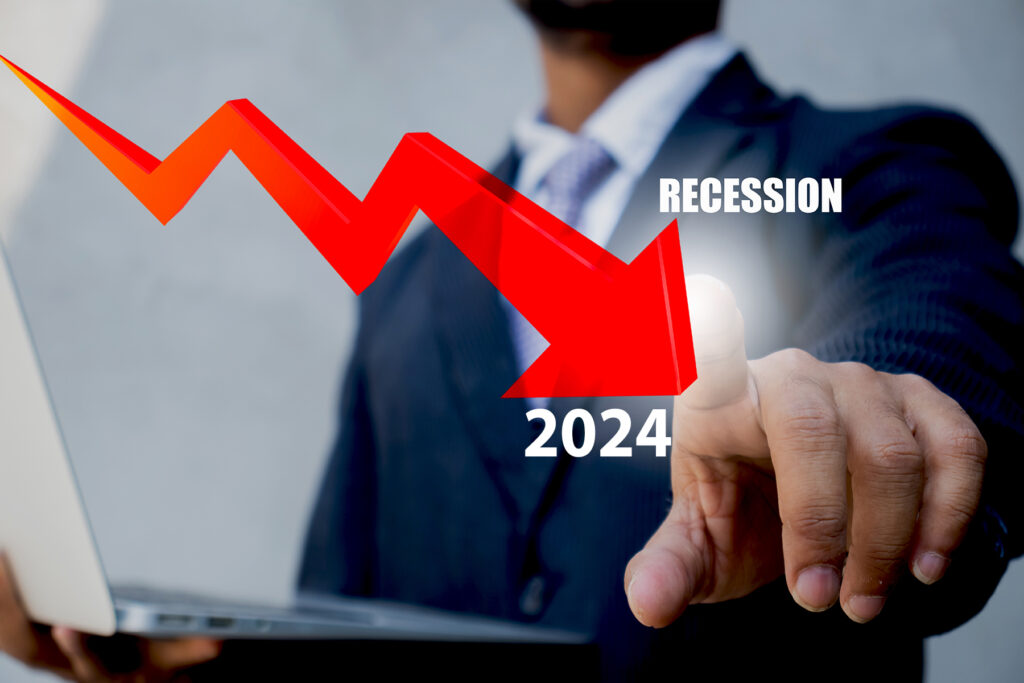The term “recession” often evokes fear as it signifies adverse news for the overall economy. Technically, a recession occurs when we witness at least two consecutive quarters of negative GDP growth, describing an economic contraction where people lose jobs, consumer spending decreases, and businesses face weaker conditions. Undoubtedly, all these outcomes are unfavorable. However, within the challenge lies the opportunity of the “Falling Interest Rates” phenomenon. The positive news is that interest rates are already on the decline. Examine the recent 10-year treasury yield chart to witness this trend.
In mid-October, the 10-year treasury yield was nearly at 5%, and it has been rapidly falling since then, currently standing around 3.9%. The descent has been swift, and the trend is highly encouraging. This development is exceptionally good news for Real Estate Equity investments. The real estate sector heavily relies on financing availability and cost, particularly on the yield of the 10-year treasury. While various factors impact the performance of equity investments in Real Estate, falling interest rates provide a welcome tailwind.
Taking a step back to review recent history, let’s consider the COVID and post-COVID world. The pandemic hit us in March 2020, prompting an immediate global shutdown. Governments worldwide took unprecedented actions, printing large amounts of money and injecting cash into the world economy. Additionally, most central banks cut rates aggressively to aid global recovery. Unfortunately, politicians and central bankers overdid it, flooding the world with cash and triggering a significant acceleration in inflation.
In essence, inflation can be illustrated as the value of 10 dollars and 10 apples, making an apple worth $1. Now, with supply chain problems, the world experiences $20 and 5 apples, resulting in an apple costing $4. This is an exaggeration, but it demonstrates how inflation is created.
Looking at today’s scenario, post-COVID “helicopter” money has run out. The Federal Reserve’s ultra-aggressive response to curb inflation is a massive headwind for the economy, decelerating inflation and potentially driving the economy into a formal recession. The consumer is “tapped out,” with savings rates falling below pandemic levels, and credit card debt reaching more than 2X pre-COVID levels. The average cost of credit card debt is now approximately 25%, compared to around 14% when interest rates were low. The Federal Reserve, using the term “Long and Variable legs,” conveys uncertainty about the effects of rate hikes on the economy. They were slow to hike, and they are just as slow to ease, often appearing to be behind in their actions.
The recent shift from “Hawks” to “Doves” includes a clear message to the market that “rate hikes” are formally over, with projections of 3 cuts in 2024. The bond market is ahead of the Federal Reserve, leading to a rapid drop in yields on long-duration treasuries. Most traders believe that U.S. inflation is consistently decreasing.

While nobody desires a repeat of the 80s with inflation re-spiking, the possibility remains. Another “Black Swan” event, leading the government to print more money or major disruptions to the supply chain, could drive future volatility in inflation and monetary policy. However, for now, it seems that the main fight against COVID-induced inflation is over, and interest rates are trending down significantly. The trend is indeed our friend. The fall of bond rates is expected to decelerate, but it should continue, affirming that “Inflation is now under control.”
The next crucial event on the horizon is an imminent recession and the resulting falling interest rates.
Falling interest rates serve as a great friend to Real Estate Equity investors. Lower rates reduce the cost of debt, causing mortgage rates to fall, increasing affordability, and driving up demand for real properties. An increase in unemployment typically follows a recession, with approximately 1,600,000 people losing their jobs for every 1% rise in the unemployment rate. Conversely, a 1% drop in interest rates translates to about 5,000,000 more people being able to afford homes. On the commercial real estate side, a 1% drop in the cost of mortgage debt results in much stronger cash flows and significant support for the values of commercial properties.
As interest rates spiked fast during and post-COVID, cash flows fell, turned negative in many cases, and valuations started to fall as Capitalization Rates (CAP Rates) expanded. The adjustment of CAP Rates is slow, with many sellers reluctant to capitulate and buyers seeking steep discounts. This resulted in a 70% fall in commercial real estate transaction volume from 2022 to 2023. Now, owners are embracing lower 10-year treasury yields, feeling relief is around the corner and approaching fast. While the market may still experience temporary expanding CAP rates due to supply and demand dynamics, the overall trend is expected to reverse with falling interest rates. This is a directional statement, and timing and effect remain unclear. What we know is that falling interest rates will exert downward pressure over time on CAP rates, supporting higher prices. Only time will tell.
Returning to the main point of this article: a recession can be a friend to Real Estate Equity investors as it drives lower interest rates.
Real Estate, usually viewed as a predictable “steady-eddy” asset class, remains true to its nature. Steady interest rates during periods of mild inflation contribute significantly to building wealth in real estate over time. Despite the recent economic roller coaster, with interest rates surging and now rapidly falling, the focus here is on the 10-year treasury yield and corresponding mortgage rates, not yet on the Federal Reserve’s actions. The Federal Reserve, as usual, is late in its response, but it will play its part as more recession data appears in the rear-view mirror.
Looking ahead, the best investment opportunities in the near term prompt many Real Estate industry heavyweight investors to favor “Mezz Debt” or “Preferred Equity” strategies. While the trend in interest rates is favorable, it might still be a bit too early to delve into heavy new positions in the Real Estate Equity world. Pricing and valuations may continue to correct throughout 2024. It’s challenging to predict when great deals will appear, but distressed individual sellers and specific case opportunities may arise. Nevertheless, assessing equity risk and future valuations is more challenging. Consequently, “Mezz Debt” seems like the right place to be, offering “equity-like returns without equity-like risks.” This simply means deploying cash between 1st lien debt (primary mortgage) and Common Equity investors, with “Mezz Debt” positioned as a relatively safe place in this environment. Full disclaimer: there is risk in everything.
Kind Regards,
Mike Zlotnik
CEO

